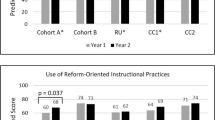Abstract
Lower division courses are typically perceived by students as “blow-off” courses. We can overcome this image. This paper contrasts active and passivelearning environments, and describes efforts to create an active, critical learning environment in both “Introduction to Sociology” and “The Family System”-typical lower division courses in Sociology. A review of grade distributions, quantitative course evaluations, qualitative course evaluations, and a survey asking students to subjectively compare the active learning course structure to the “typical” multiple choice format provide evaluation data. Finally, the paper discusses problems in using these innovations.
Similar content being viewed by others
References
Beck, Evelyn Torton, (1983). Self-Disclosure and the Commitment to Social Change. pp. 285–291 inLearning Our Way: Essays in Feminist Education, edited by Charlotte Bunch and Sandra Pollack. Trumanshurg, NY: The Crossing Press.
Collins, Patricia. (1986). Perspectivity and the activist potential of the sociology classroom.Humanity and Society, 10:341–360.
Ericksen, Stanford. (1971). Grading/Evaluation.Memo the Faculty. University of Michigan.
Faery, Rebecca Blevins. (1987). Women and writing across the curriculum: Learning and liberation. pp. 201–212 inTeaching Writing: Pedagogy, Gender, and Equity, edited by C.L. Caywood and G.R. Overing. Albany, NY: SUNY Press.
Fiore, Kyle, and Nan Elsasser. (1982). “Strangers no more”: A liberatory literacy curriculum.College English 44:115–128.
Freire, Paulo. (1970).Pedagogy of the Oppressed. New York: Seabury Press.
Friedrichs, David O. (1987). “Bringing Ourselves Back In: The reflexive dimension in teaching a humanist sociology.”Teaching Sociology 15:1–6.
Goertzel, Ted, and Joseph Fashing. (1986). The myth of the normal curve: A theoretical critique and examination of its role in teaching and research. Pp. 205–225 inReadings in Humanist Sociology: Social Criticism and Social Change, edited by Walda Katz Fishman and C. George Benello. Bayside, NY: General Hall.
Goldsmid, Charles A., and Everett K. Wilson. (1980).Passing on Sociology: The Teaching of a Discipline. Belmont, CA: Wadsworth.
Grzelkowski, Kathryn P. (1987). A journey toward humanistic testing.Teaching Sociology 75:27–32.
Keating, Barbara R. (1987). Reducing classroom alienation: Applications from theory.Teaching Sociology 15:407–409.
Lineweber, David C., and Edward F. Vacha. (1985). Advising students with problems in introductory sociology.Teaching Sociology 13:70–94.
Miller, J.P. (1976).Humanizing the Classroom: Models of Teaching in Affective Education. New York: Praeger.
Mills, C. Wright. (1959).The Sociological Imagination. New York: Oxford University Press.
Pestello, Fred P. (1987). The social construction of grades.Teaching Sociology 15:414–417.
Rogers, Carl. (1969).Freedom to Learn. Columbus, OH: Charles E. Merrill Publishing Co.
Schniedewind, Nancy. (1983). Feminist values: Guidelines for a teaching methodology in women's studies. Pp. 248–260 inLearning Our Way: Essays in Feminist Education, cited by Charlotte Bunch and Sandra Pollack. Trumansburg, NY: The Crossing Press.
Schniedewind, Nancy. (1985). Cooperatively Structured Learning: Implications for Feminist Pedagogy.Journal of Thought 20:74–87.
Wesley, E.B. (1972). Organization: The individual's opportunities, not the teacher's obligation.Social Education 36:846–850.
Wheeler, Charlene Eldridge, and Peggy L. Chinn. (1984).Peace and Power: A Handbook of Feminist Process. Buffalo, NY: Margaretdaughters, Inc.
Additional information
Randy Stoecker recently received a Ph.D. in Sociology from the University of Minnesota, and has been exploring alternative pedagogies since 1982. He has published in the areas of social theory and social movements. An earlier version of this paper was presented at the Midwest Sociological Society Annual Meetings, Minneapolis, Minnesota, 1988. Many thanks for insightful comments by Tuck Green, Ron Berger, and an anonymousInnovative Higher Education referee.
Rights and permissions
About this article
Cite this article
Stoecker, R. Strategies for enhancing learning in the “blow-off” course. Innov High Educ 14, 141–153 (1990). https://doi.org/10.1007/BF00889615
Issue Date:
DOI: https://doi.org/10.1007/BF00889615




